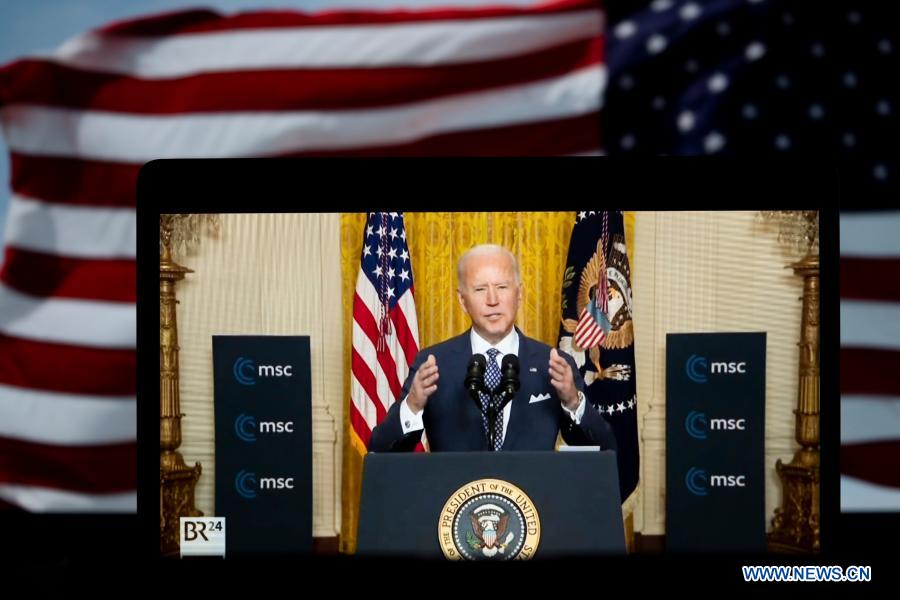


Photo taken in Arlington, Virginia, the United States, on Feb. 19, 2021 shows a screen displaying U.S. President Joe Biden speaking in Washington, D.C. during a virtual event with the Munich Security Conference in a video provided by the U.S. State Department. Biden said on Friday that the United States is returning to the transatlantic partnership and will address global challenges like climate change and the COVID-19 pandemic. (Xinhua/Liu Jie)
BERLIN, Feb. 19 (Xinhua) -- U.S. President Joe Biden said on Friday that the United States is returning to the transatlantic partnership and will address global challenges like climate change and the COVID-19 pandemic.
"I'm sending a clear message to the world: America is back. The transatlantic alliance is back. And we are not looking backward," Biden said in a video message to attendees at the Munich Security Conference, which was held virtually this year due to the coronavirus pandemic.
As the first sitting U.S. President attending this event, Biden said that his administration will work closely with its European Union (EU) partners and the capitals across the continent, stressing that the United States is fully committed to its alliance with the North Atlantic Treaty Organization (NATO).
"I know the past few years have strained and tested the transatlantic relationship... The United States is determined to re-engage with Europe," Biden said, referring to the worsened U.S.-Europe relations during the previous administration of President Donald Trump.
Washington will work closely with its EU partners to meet the shared challenges and will continue to support the goals of Europe, he said.
Biden also urged the United States' European allies to double down on commitments to fight climate change, warning of a "global existential crisis."
"We can no longer delay or do the bare minimum to address climate change," Biden said, only hours after Washington formally returned to the Paris Accord.
Biden said that the COVID-19 pandemic was an example of an issue that required global cooperation, calling for the reform of the World Health Organization and the building of a United Nations system that focuses on biological threats and can initiate swift action.

 Award-winning photos show poverty reduction achievements in NE China's Jilin province
Award-winning photos show poverty reduction achievements in NE China's Jilin province People dance to greet advent of New Year in Ameiqituo Town, Guizhou
People dance to greet advent of New Year in Ameiqituo Town, Guizhou Fire brigade in Shanghai holds group wedding
Fire brigade in Shanghai holds group wedding Tourists enjoy ice sculptures in Datan Town, north China
Tourists enjoy ice sculptures in Datan Town, north China Sunset scenery of Dayan Pagoda in Xi'an
Sunset scenery of Dayan Pagoda in Xi'an Tourists have fun at scenic spot in Nanlong Town, NW China
Tourists have fun at scenic spot in Nanlong Town, NW China Harbin attracts tourists by making best use of ice in winter
Harbin attracts tourists by making best use of ice in winter In pics: FIS Alpine Ski Women's World Cup Slalom
In pics: FIS Alpine Ski Women's World Cup Slalom Black-necked cranes rest at reservoir in Lhunzhub County, Lhasa
Black-necked cranes rest at reservoir in Lhunzhub County, Lhasa China's FAST telescope will be available to foreign scientists in April
China's FAST telescope will be available to foreign scientists in April